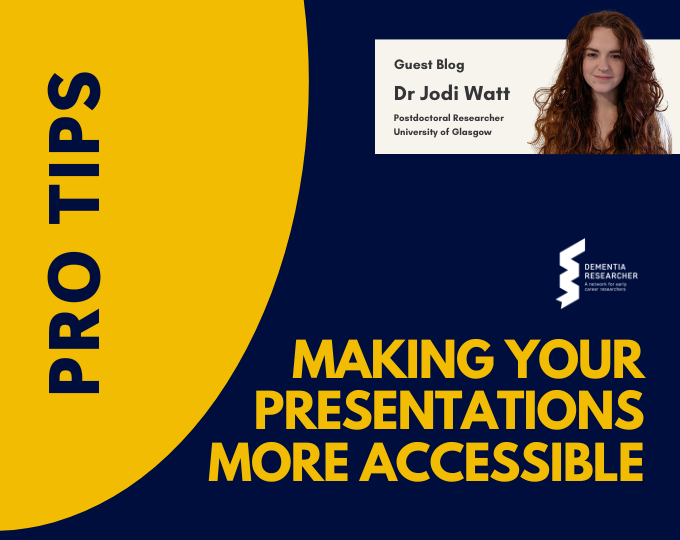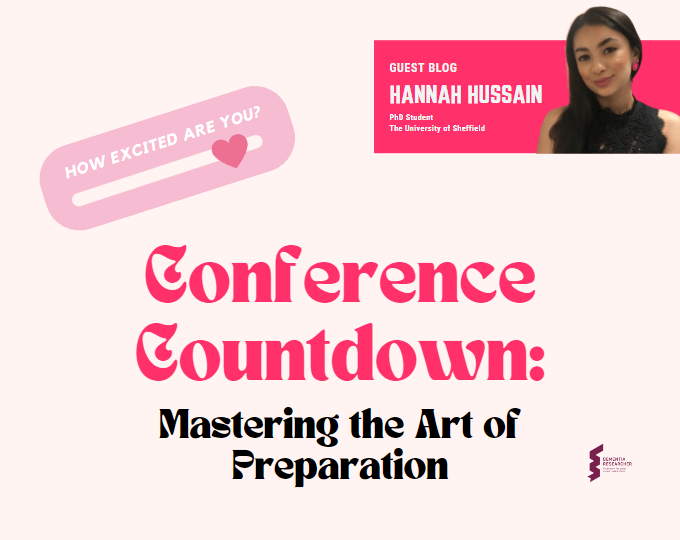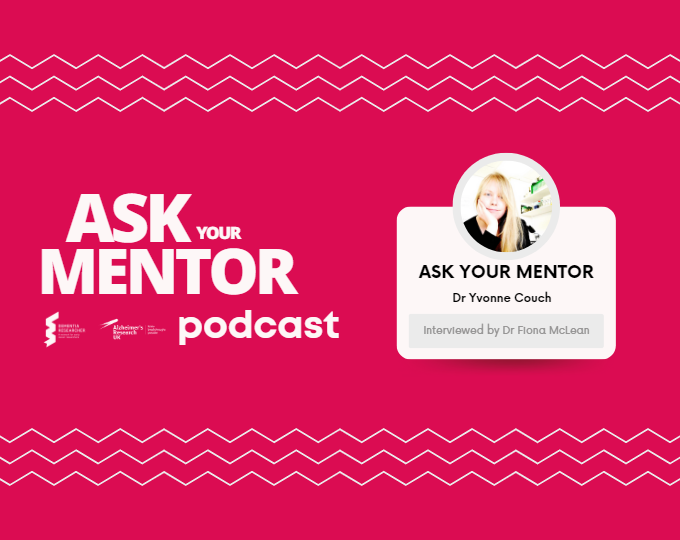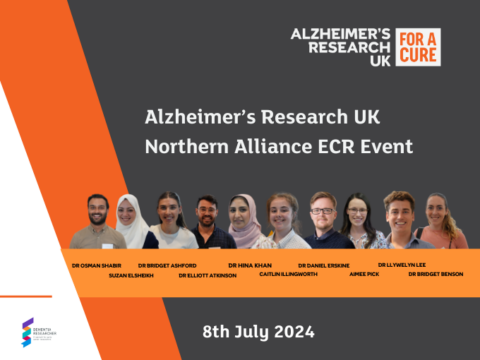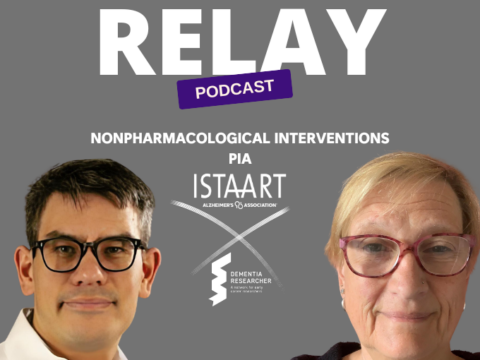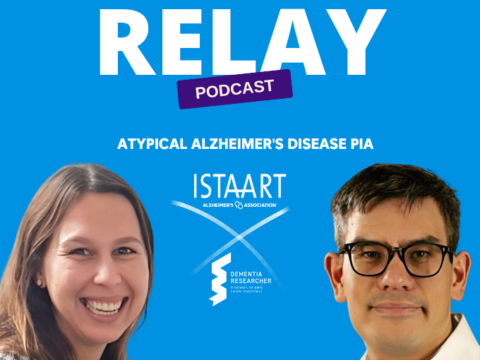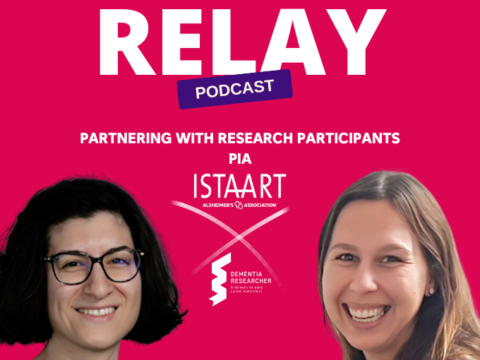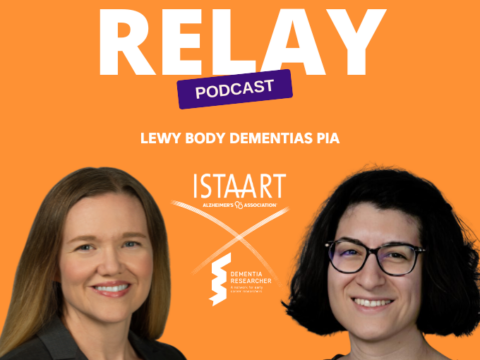Last week we were in Liverpool for this years Alzheimer’s Research UK Conference. Hearing from researchers talking about their work and to learn about the latest discoveries in dementia research.
In the show guest host Dr Yvonne Couch the University of Oxford talks with Dr Becky Carlyle, Alzheimer’s Research UK Senior Research Fellow & Yasmin Bonsu, Undergraduate placement Student both from the University of Oxford and Dr Jodi Watt, Postdoctoral Research Analyst from University of Glasgow.
Voice Over:
The Dementia Researcher podcast, talking careers, research, conference highlights and so much more.
Dr Yvonne Couch:
Today we're in Liverpool to bring you highlights from the UK's largest dementia research conference run by Alzheimer's Research UK.
I'm Dr Yvonne Couch. I'm an associate professor at the University of Oxford and I work on stroke and extracellular vesicles and vascular dementia. Today, I am joined by three amazing guests to talk about the highlights from the ARUK Annual Conference. We've got old hand, Jodi Watt, who writes regular blogs for us, and we've got two newcomers, Becky Carlyle and Yasmin Bonsu who are going to share with us what they really enjoyed from the ARUK Conference. Say hello, guys.
Dr Jodi Watt:
Hi.
Yasmin Bonsu:
Hi.
Dr Becky Carlyle:
Hello.
Dr Yvonne Couch:
I think it will be useful to have an introduction from everyone. So, Jodi, you're a regular blogger, so why don't you go for us?
Dr Jodi Watt:
Sure. So, I'm Dr Jodi Watt. I'm a postdoc at the University of Glasgow where I work with Terry Quinn on drug repurposing currently, and I'm also coming at this from a clinical perspective.
Dr Yvonne Couch:
Excellent. So, Becky, we chat all the time, so I know what you do, but why don't you tell our listeners what you do?
Dr Becky Carlyle:
Yeah. So, I'm Dr Becky Carlyle. I'm an Alzheimer's Research UK senior research fellow, and my work is focused on cognitive resilience. So, some people get a lot of amyloid pathology in their brains, and they have very severe cognitive symptoms. Others barely experience any cognitive symptoms at all. So, I use techniques like proteomics to try and find out what's different about the brains of resilient people versus susceptible people.
Dr Yvonne Couch:
Excellent. Yasmin, I know you've been doing some work with Becky. Can you tell us a little bit about your background and what you've been up to in the lab?
Yasmin Bonsu:
Well, I'm Yasmin Bonsu and I'm undergraduate student from the University of Manchester and I'm currently doing a placement year under the supervision of Dr Becky Carlyle. I am looking at neuropeptides from the granin family and how they could possibly promote resilience and cause core neurons that are insulted of amyloid beta.
Dr Yvonne Couch:
That's very cool. Excellent. Thank you. And thank you for joining us.
For new listeners, let me explain the format of the podcast. So, it is quite simple. Essentially, we're going to go around three or four times. We're going to talk about each day of the conference, we're going to say some things we like, we're maybe going to talk about some things we didn't like, or we found a bit controversial and we're going to start with the ECR day. Now, fortunately all my guests today were at the ECR day, so we're going to start there. And Yasmin, you are our official ECR guest because I feel too old to be an ECR now, so I don't count, but you are definitely an ECR. Tell me what you loved about the ECR day or what you hated or what you found interesting.
Yasmin Bonsu:
Okay, ECR day, I liked how there was so many research assistants, postdocs, PhD students and it was a way for me to network and basically ask people how they got to where they are. As an undergraduate myself, I'm questioning what do I want to do next? So, it was a good way for me to get some more information about what the next steps could be like. Should I do a master’s and then go on to do a PhD? Should I just skip master’s all together and then go on to do a PhD? So, it was good to get insight on that. Additionally, I was really moved by the talk from Alison and Frank, that couple, it was just really beautiful.
Dr Yvonne Couch:
It was.
Yasmin Bonsu:
I wanted to cry but I didn't want to ruin my makeup. But yeah, I was really touched by the story, and it just made me really special to be a part of an organisation that's helping them and others as well.
Dr Yvonne Couch:
And they do it every year and its always very sort of puts your work in context, but I was unprepared for it. So last year it was my first in-person one and I was blissfully unprepared for it. I sat down and I was like, what is this? And I'm just weeping, and it was awful. And you cunningly hid in your hotel room so you could cry in public, and nobody notice.
Yasmin Bonsu:
I think every ARUK conference now, the first session will be taken online at home. I can cry as much as I need to cry, then put my makeup on and go do the rest of the conference.
Dr Yvonne Couch:
It's absolutely devastating. But I also think it's really motivating as well. I know everything that we do sometimes seems quite removed from that, but it does feel like you're, I don't know, making a contribution. So, I'm glad that was your favourite bit.
Yasmin Bonsu:
Yeah, it was.
Dr Jodi Watt:
I think that's something that also as someone who works clinically, I think that's really important as well because a lot of conferences that I've seen that have a bit more of a pre-clinical tone to them often sort of miss out having the sort of patient representation or familial representation there. So, I was on the early career’s day, I was really struck by Jordan's talk. So, Jordan is somebody who has familial history of frontotemporal dementia and also carries a gene for it. And I think the things that he was doing are just incredible and it was really nice to have that perspective as well because something at the top he mentioned before was, yeah, I was nearly crying as well, but I was also nearly crying at Jordan's because I think we often focus more on the old age aspect of it and he is younger than I am and he's facing that sort of thing and that sort of knowledge about himself going forward. And I just think it was incredibly very inspiring talk.
Dr Yvonne Couch:
I think it's really nice to have that. We've got our local network coordinator, Katie, she's here and she fundraise tonnes for ARUK, and it was so nice to have the fundraisers here as well and so you can show them what you do. So, I took Katie over to my poster, it was so much fun to go. You ran; however, I think she ran a marathon or a tonne of marathons.
Dr Becky Carlyle:
Three marathons.
Dr Yvonne Couch:
Three marathons, she three marathons and she raised way more than 5K, but I got 5K and I was like, this is what it's done, and it's launched another project and that's got me a job for two years and it's amazing. So, I think that sort of feedback between the people who have the disease and the people who are giving the money and the people who are doing the science is really, I think it's done really well at ARUK.
Dr Jodi Watt:
I think there's definitely a tone from those sorts of speakers about how it felt like it gives them purpose and I think you root that purpose in something tangible and I think that's really important as well. And I think ARUK does that really, really well.
Dr Yvonne Couch:
Exactly. So, Becky, you gave a talk on ECR day. Did you get good feedback? Did you enjoy it? How did you find it?
Dr Becky Carlyle:
A lot of people enjoyed it. Not too much specific feedback, which is good because it just came out last week. But yeah, I think I managed to get across that my lab is a fun place to work, and I hope a supportive environment and I think that is just as important as a science that we do as well.
Dr Yvonne Couch:
And I think like you say, getting your name out there and going, this is what I do is so useful for networking and stuff like that because suddenly everyone goes, oh, she's the proteomics lady, I'll go talk to her about that. And you get known as a thing and people point other people to you and it's just a useful way to put your name out there, especially to younger people who might want to come and work for you. Yeah, cool. So that was the ECR day, but the ECR day format is not necessarily the same as the rest of the conference. It's definitely much more focused towards younger people and showcasing their work, but the main conference is obviously much more sort of a traditional conference with sessions with different focuses. So, we'll talk about that next. So, day one, Jodi, we'll start with you. What did you enjoy about day one of the conference?
Dr Jodi Watt:
Good question. Surprisingly to my general being as a scientist, I actually really enjoyed the AI debate. To set tone, I am very sceptical of AI's involvement in things like diagnostics because I know the sort of black box element of things for people who don't intrinsically understand AI or have to do a bit of, I just trust that this thing works is really scary to patient populations and obviously working more clinically, I am more aware of that sometimes than people who work pre-clinically. What was a real highlight of it for me was the fact that although everyone involved in it was clearly in the world of AI to have the knowledge base to do it, it really highlighted for me the scope of their knowledge and the understanding of their knowledge in something like ai, which when you're someone who's trepidatious about it, it's really reassuring.
And as someone who has certain minority characteristics, which I've written about at length so I won't bore you with just now, it was really reassuring for me to see that they recognised those and it ended up being a really interesting space where almost to win the debate they were having to discuss that at length. And that's often the end sentence of a, we know we need to do this better on a poster or an abstract and it's really good that that got airtime even though that wasn't the direct topic. And as a sceptic who voted and was in a very low proportion of people who voted against the motion for AI at the start, I really enjoyed that that was the motion that ended up winning out personally.
Dr Yvonne Couch:
It was only about 10% at the start, wasn't it? Who said they thought it was a bad thing and then it went up to 60%.
Dr Jodi Watt:
Yeah. So, I felt vindicated, not that it was about me, but yeah.
Dr Yvonne Couch:
No, I think it was really nice. And David Llewellyn was so, he was very eloquent about, I liked his phrase about bias getting accidentally baked in and the risk of that happening if we just start using it now without thinking about what we're programming into it and stuff like that. I liked that because it was a bit of a debate. There was a lot of AIS in this conference though.
Dr Jodi Watt:
Yes, that's a fair comment.
Dr Yvonne Couch:
I don't do AI, I don't do big data, so I haven't found it baffling and ever slightly boring.
Dr Becky Carlyle:
We didn't actually even talk that much about results that AI has generated. We talked about building platforms for it, we talked about a little bit about the basics, but not really enough for anybody to walk away thinking, oh I understand this now.
Dr Yvonne Couch:
Yeah, exactly.
Yasmin Bonsu:
And we didn't really talk about use cases, and we could have had a talk on somebody using it to do some kind of image analysis or a new diagnostic pipeline. We didn't see any of that. We just had these kind of scare stories and debates, but nothing about use case.
Dr Jodi Watt:
But this harks to the black box idea that patients are, and people living with dementia, I should say, sorry, there are fears around that sort of thing. So yeah, I glad that that was picked up on, but I don't feel like I left the debate knowing what we do about that.
Dr Yvonne Couch:
No, but I think that's one of those big life decisions that everybody is slightly terrified to make.
Dr Jodi Watt:
Sure, absolutely. I mean I don't have an answer.
Dr Yvonne Couch:
No, no, no. I don't have an answer either. I think somebody needs to make that decision at some point, but I don't know how you go about doing. It's kind of like the euthanasia thing and just worse. But yeah, I had a discussion about the multiomics, the session that you were in, and there are a few people who were like, it would've been really nice to make that more of a, how can we use all of these techniques to answer more questions rather than, this is my technique, this is my technique. Not that it was bad, your talk was lovely, but I think there was scope to make it a bit more, not inclusive, I'm not even entirely sure what the word is, but a bit more sort of, let's think about how everybody could use these kinds of things. But it was interesting, and I did enjoy the debate, I liked watching it and I definitely switched my mind because I was like, yeah, AI sounds great. I know nothing. Becky, tell me about your highlights. Fantastic.
Dr Becky Carlyle:
Well that actually leads on, so I think my highlight is a very strange one because it was a very dry talk and I hope Vanessa forgives me for saying that. But I think Vanessa Raymond's talk was very important because that shows exactly that people are working really hard to build these platforms that you're talking about. So her role is dementia platforms, UK lead, and in building together the network of brain health centres from across the UK, those are the kind of setups that we need to be able to do these kind of studies ethically with the power that they deserve and to have the ability to integrate these data sets across different modalities. So, forgive me, Vanessa, it was a bit of a dull talk, but what she's building and what she's collaborating with to do is really critically important. And to get slightly political should be government funded now.
They're struggling to scrape together pots of money from all over the place. This should be a central thing that the government is trying to fund because with the structure of the NHS, with the work that they're doing, we could be streets ahead of every country in the world on this. We have a more diverse population than most of the developed European nations. We can maximise this and we can really be the leaders in this space. So, I can't say it was the talk I enjoyed the most, but I think it was the most important message for where we're headed. And if they get the money that they deserve, then the future that we should have in dementia research in this country.
Dr Yvonne Couch:
Yeah. Oh, it's all about money. Somebody said at some point about funding, bigger picture stuff. And he was like, it's not all about the money. I was like, yes, it is. It's all about the money. You can't fund this kind of research because it's all longevity. Nobody gets dementia and then dies the next year. I mean some people do, but it's much rarer. It's a very long progressive disease. And so, you need people who can monitor over that length of time, and you can't do that with a four-year fellowship. It's just not possible. So, more money, more money will be better. Government, more money, please. Yasmin, tell us what your highlight was from the first day.
Yasmin Bonsu:
The first day, it would have to be the talk presented by Dr Soraya Mehta. That process, her mythology of what she was doing was insane. She was using live human brain slices and then cutting them up and putting them into culture medium. And then they were characterising Alzheimer's pathology and looking at how endogenous amyloid beta is affected using an inhibitor called BACE-I. I can't remember the actual name of it, but BACE-1. I thought just using an actual human brain was pretty cool. If you've got post-mortem samples that you could use. And that in itself isn't pretty amazing, but to use someone's actual real brain and then carry on creating a more translatable model to study a neurodegenerative disease, it was pretty impressive. I mean I can imagine it's an expensive process, but a cool process, nonetheless. And I was very inspired by it.
Dr Yvonne Couch:
It was very much. Yeah, it was really cool. I really enjoyed though the questions that came after her talk. There were so many questions. It was obviously a really popular talk, but I think my favourite one was, do you think these slices can still think.
Half of your brain is in a dish somewhere going help, let me out. I was like, that was the best question ever. So, I will briefly give my highlights from the first day and then we can move on to day two. Was anybody in the session in auditorium to where Ramona Weil talked? So, this is far outside my comfort zone, but she gave such a good talk. So, she does visual stuff and it's all about the progression of people who have Parkinson's but progress to get dementia and go into cognitive decline.
And that doesn't happen in all Parkinson's patients apparently. And one of the things she's found is that the people who do progress to dementia have early visual changes that you can see. And so, she's gone and done this huge battery, a visual test, and my favourite one, they called the cats and dogs test, which is they take a picture of a cat, or a dog and they basically slant it to the point where it becomes almost... She put one up and I'm there going, I don't. she didn't say it was a cat or a dog when she put it up.
And I'm looking up at it going, what is that bunch of grey blobs? And then she said, it's pictures of cats and dogs. I was like, oh, it's a dog. I've not got dementia. It's fine. And apparently the people who are more likely to progress to dementia find those slanted pictures really, really difficult. And so, she's now got all this sort of battery of visual tests to use as almost as an early biomarker, which I just thought was very cool. I was like, it's very easy to do. You're not sticking needles in people; you're not putting them in expensive magnets. You're just getting them to look at pictures and you're able to say very early, this person is more likely to go down this path, so maybe we can jump in. So, I just thought. And she was just a very good speaker, which I always appreciate at conferences, but then we had day two. So, Yasmin, I'll start with you this time. Tell me what you enjoyed about today essentially.
Yasmin Bonsu:
It would have to be the talk we had about, in healthcare, there's a lot of disparities when it comes to diagnosing people with dementia. There are currently some resources that are available right now. I think one of the ladies that was presenting is called Mila Cavipetto. She has founded a programme called the WW Fingers, and essentially, it's looking at trying to diagnose people earlier on across all demographics and across all geographic locations. I thought that was pretty important because today I would agree that when it comes to ethnic minorities, they feel very reluctant in going into the GP or to the doctors to address their healthcare concerns. They feel like they'll get dismissed or they won't get their problems gets viewed properly. So, it's nice to know that there's people in science that are doing their best to address that inequity.
Dr Yvonne Couch:
Yes, definitely. It's still a massive problem with women going to the doctors who are like, well, I've got this pain. They're like, well, you're a woman. It's probably just period pains when it's clearly not. And there's a lot of stigma. It's the same with mental health. There's a lot of stigma about going in and going, I'm getting a bit forgetful. You don't want to feel like you should go and see someone, but actually you probably should.
Yasmin Bonsu:
Yeah, one of the panellists, they mentioned a stigma, I think it was in Nigeria. Some patients don't want to actually be classified as I have dementia because then they'll get branded as a witch or something like that. And I didn't know that. So that was quite surprising to me. There is a stigma around having actual disorder.
Dr Yvonne Couch:
And especially when it's brain stuff, I find that people don't, a tumour is a big thing that grows on you and you can kind of see it or you can see it in a scan, but your brain is still, I think a bit of a black box. And so, people, when stuff goes wrong with it, people get very uncomfortable.
Yasmin Bonsu:
That's so true.
Dr Yvonne Couch:
It's not good. Jodi, tell me what you enjoyed about today.
Dr Jodi Watt:
So, I'm going to take something that was slightly off a conference plan because it was at lunchtime, and I was expecting it to be low attendance and I was actually incredibly surprised at how many people kept coming in. So, it was the women in Neuroscience talk, which is interesting for me as someone who falls down a gap of gender and doesn't really conform to that. But I wanted to go, and I wanted to see their plans, what they're doing, how they might be able to fit someone like me into their narrative because obviously when you don't identify with that, the word woman is quite intense as a choice. But I had spoken to, I can't remember her surname, but Lizzie.
Dr Yvonne Couch:
English? Lizzie English.
Dr Jodi Watt:
Possibly.
Dr Yvonne Couch:
She's the main win person.
Dr Jodi Watt:
Who founded the whole thing, and I was really impressed with her. So, I went along, and I just feel very excited about what they're planning on doing. I also really enjoyed, yes, I didn't see myself on the panel, but I appreciate that having someone or gender non-conforming is tricky without being tokenistic, but there was a lot of diversity in the women that were on the panel. And there was also a lot of transparency, which I really appreciated. It was very nice to hear people, two of whom were professors talk so openly but very, carefully isn't the word, but they were very pointed in what they were saying, but they were being very open and I think that that was really nice to hear people also senior be like, yeah, it's quite bad. It's not great about gender, it's not a great thing.
So, I was actually really impressed with that and there were so many questions, and I was a bit like, oh, my question didn't get answered. But at the end, Lizzie said that she'd taken note of everyone's questions and she's going to address them all. So, I actually felt very, very heard in that space. So, although some of it isn't great for me, I feel like there's active effort to change it. And I think that thematically has been something for me that I've noticed in the conference that where there are issues like that, people are trying to change things, which is exciting. And I just massive shout out to her because she's really done a great job. I think/
Dr Yvonne Couch:
Definitely. I think we've had this conversation a lot at Oxford about, it's almost like, I'm not saying you don't need more women in neuroscience, that's definitely not a thing, but we've now got lots of people at our stage, but it's getting lots of people above us. And it's nice they have female professors because you can then see that it is a thing, but it's still not enough of a thing. I'm hoping that's what's going to be the next stage of all of this.
Dr Jodi Watt:
It would be nice to see some sort of development with regards to other genders and their representation. Because I was having this conversation with someone earlier. People have referred to me as a role model and that's fine, but I'm an ECR. I'll happily be it, but I am an ECR. And normally when we look at academia, we're talking about professors who've done multiple nature papers or something like that or had a huge discovery. And as someone who's ECR r, where's that person for me? That's tricky. So, what I took from that was actually she was so good. She might be the person to do it. She might be the person to get the representation that I'm looking for, which is incredibly impressive because I'm used to going to conferences and being like, Nope, but actually-
Dr Yvonne Couch:
None of this is working for me.
Dr Jodi Watt:
...for once I was like, maybe.
Dr Yvonne Couch:
Can I ask you a personal question?
Dr Jodi Watt:
Sure.
Dr Yvonne Couch:
Do you have a role model or are you working as your own role model?
Dr Jodi Watt:
It's an interesting question. I think that what I think a lot of people look for in science as a direct role model, and I definitely don't have that. I would say that there are a bunch of people that I work around to do things in such a positive way that they are inadvertently my role models. But in terms of how I hear people talk more traditionally about role models, like people being like, this female professor is incredible. I want to do what she's doing. I want to have the success that she's doing. And she's managed to do it whilst it's also having children, which is an annoying caveat to things, but one that is touted a lot, that sort of thing I don't have, and I almost have to be it for myself, otherwise what am I going to do? Because I have to find it somewhere. And it has been pointed out to me that it's one of my strengths and that that's advantageous. But it is tricky to be like, oh, I have to be this for myself. Okay, cool.
Dr Yvonne Couch:
Let's just roll with this and see how it works.
Dr Jodi Watt:
And it is meaningful, isn't it? It's easy for somebody who's a white male to just bat it away. This is important. But Yasmin, you met Yasmin Hurd a couple of weeks ago, right? Talk about the experience for you.
Yasmin Bonsu:
Oh, she was absolutely delightful. She was talking about her work in addiction and she's a professor at Mount Sinai. And after her talk, I was a bit scared to go up to talk to her because, I mean, she's a big name and I'm just regular Yasmin. But when I spoke to her and expressed how scared I was, I come up to her, she was like, you don't need to be scared, I'm just like you. And she gave me helpful advice in how to progress in my career and the number one thing she said was to network. And that's what I carried with me today and this week actually. Yeah, it was nice talk.
Dr Yvonne Couch:
Because presumably, and this is again, you might be a little young maybe to have a role model, but it's okay. There is not a great deal of people of colour in senior positions. Do you think that's a problem or is there someone who you see as that kind of role model for you?
Yasmin Bonsu:
To be honest, before I met Professor Yasmin Hurd, I didn't really have a role model like that. I wouldn't say it was a problem because I think in the academia field, academic field story, I wasn't really surprised. There's not a lot of people that look like me in higher positions. So, I wasn't going to have my hopes set to have, oh my gosh, I need to see someone like me as a professor or a senior doctor. But to see Professor Yasmin Hurd up in that stage in Oxford, giving a nice lecture to lots of people, I realise I can look further on models now. So, I'm going to start doing that. As of right now, she's my number one.
Dr Yvonne Couch:
Excellent.
Yasmin Bonsu:
Along with Becky.
Dr Yvonne Couch:
Obviously, Becky is everybody's role model, including mine. Becky, have I asked you your highlights?
Dr Becky Carlyle:
No.
Dr Yvonne Couch:
Tell me about your highlights.
Dr Becky Carlyle:
And I have some science highlights for today.
Dr Yvonne Couch:
Excellent. Tell me your science highlights.
Dr Becky Carlyle:
So, I thought the science was much, much more interesting today. We had real experiments, real data. In fact, I have too much competition, so I thought Chloe Anderson, the person that won the ECR talk award for the drug repurposing, thought that was really, really great. I would really love to see her extend it to electronic health records and see if any of the drugs she found have got any data there. Ryan Bevan was brilliant talking about PLC Gamma in the inflammation. But I mean Saba Siddiqui, it was almost like somebody had told AI to write the talk that would most appeal to Dr Becky Carlyle. Because it hit all my favourite techniques. It did it so elegantly. I think she did a really good job of talking about how they fit together, how they built this puzzle about the cryptic exons and whether they produce peptides in TDP-43 pathologies.
And then she did a really, really great job when people at the end were kind of asking her what are they for and they are about? Of just talking about the uncertainty. Yes, this is a possibility, this is, but accepting that we don't know what they're for yet. We don't know if they do anything. But they definitely exist, so we've got a biomarker maybe, but who knows what else might come from those. And it was such a confident presentation, it was so well put together. And I mean ribo seq proteomics. I mean, it really was as if somebody had written my dream talk.
Dr Yvonne Couch:
You're such a nerd.
Dr Becky Carlyle:
I know. And then she did an incredible job of presenting it. She did.
Dr Yvonne Couch:
It was really good. And she was about the fourth person who'd mentioned cryptic exons and she was the only person who actually explained what. Everybody just kept dropping it in. And I was going, I don't know what a cryptic exon is. And she told you. She had a diagram. I'm a big fan of a nice clear talk. And yeah, we did actually have a surprising number of those. There weren't that many people who just leapt in and went, here's all the science. I think there were quite a lot of good, not in my opinion quite enough of them, but there were quite a lot of good talks. My highlight was mostly because I did my highlights really early in the day, was Siddharthan Chandran, the director of the DRI who spoke right at the beginning of the day. And the reason I liked his talk, and again, it wasn't particularly sciencey, but he highlighted all of these big things that were not. At one point he said, people age, their biological age happens at different rates and is that a good thing.
Is that a bad thing? Why does it happen? And then he just went, we don't know. And I was like, great. I really like it when people say these are the questions and these are the answers, and this is what we don't know about a subject. And I think at conferences especially, people are so keen to go, this is my data, and this is what it means. And there's not enough of actually this is my data, and I don't know what it means and here are the next things that I could do to find out. I think embracing uncertainty is a bit more fun.
Dr Jodi Watt:
I think that's been tonally interesting about this conference because I definitely come from a world where people are like, here are all the positives about my science. And then when you go, when I say this, I mean my PhD sort of time when you go, but what are the problems? They go, no problems, that sort of thing. And I definitely think this conference particularly has been good for people being like, yeah. When it's appropriate to do so. But I think that's really important because that sort of thing is imperative to our understanding where rather than bluffing and confusing, it's so much better to just go, no idea to be honest.
Dr Yvonne Couch:
And I love it. I find that post... we'll chat very briefly in a second about the poster session, but I find that poster sessions are really good for that because you're stood in front of someone and whilst you've got in front of you the optimised peak version of their data. Because you're chatting, they will often go, oh yeah, but we tried that and it didn't work, or we tried this. And it becomes a little bit more realistic and what we all experience in the lab. This is off the cuff; did anyone have a favourite poster that they enjoyed?
Dr Jodi Watt:
Other than my poster?
Dr Yvonne Couch:
Other than your own poster obviously.
Dr Jodi Watt:
Well, something that I didn't fully comprehend about ARUK, and it's my own fault coming in, was how pre-clinical this specific conference is. So, my real interest because of different fields and a slight lack of understanding was in predominantly the clinical stuff. But I had some very interesting discussions about some of the results that I was seeing in relation to what was being seen in cell culture in the clinic. Not in the clinic, in the lab. And I thought that that was particularly interesting. I can't at the moment remember the name of the person who did that, but I really enjoyed their poster. And I also, I love a good clinical poster and I think there were a lot of them.
There was one next to me, which was focused on, I'll absolutely butcher attempting to remember the title of it, but it was focused on ethnic disparity specifically was I think the terminology they used in dementia research. And I think something like that's so fundamental and so important. But when we talk about different types of science or sometimes when we go up the scientific hierarchy to some of the professors and stuff, they're so focused on the cutting edge that they sometimes forget about that sort of thing. So, it was really nice to see that represented at a conference like this.
Dr Yvonne Couch:
Nobody's mentioned Tamaryn Lashley, which I've devastated about because I assumed somebody else would take her as a highlight. So, I will mention her name now because I thought her talk was amazing, but one of the reasons I thought her talk was amazing was because she put up some nice basic immunohistochemistry here. I've stained some brains and like you say, there's so many people doing all this cutting edge stuff that sometimes I do a lot of basic immunohistochemistry and sometimes I feel like I'm sort of almost like chiselling in the stone age and everybody's judging me for being a bit backwards, but actually it's still being done. And I think if it's done well and hers was just beautiful, it's really nice, like you say, to see that put out there being done and being done well. And she's lovely and she was a big... My favourite bit about her talk was her very end slide when she went a little bit crazy about all of her alumni and how proud she was of them and where they've all gone and stuff. And it was just Great.
I think her talk and also the poster session generally highlighted for me as well, the purpose and the utility of back translation. Because I think from a clinical perspective, we can sometimes be a bit egotist about how preclinical people need to translate. They have to translate, but then when people are like, well, you need to back translate, we're like, no thanks. And that was really highlighted for me as well. When I see that’s, I think how I find talks about preclinical stuff engaging, when I can recognise my work in it, which is sometimes a struggle, particularly when people don't explain what things are like you Mentioned before.
Dr Jodi Watt:
And particularly when it's really, really niche molecular biology. How does this relate to a human? I don't understand, Yasmin, this would've been your first poster session. How did you find the experience?
Yasmin Bonsu:
What can I say? I thought that it was a good experience for me. I got to have a couple of comments someone recommended that we could try using a cell line that creates its own endogenous amyloid beta. So, to get feedback like that, I realised how important it is in order to develop your work. Before in university when it comes to doing practical’s, you don't really have a lot of attention to it. You're just following mindlessly the instructions of what to do. And you don't really have any, you don't feel like there's any worth to you if that makes sense. But with your own research, it's like you're baby. So, you want to try and find everything you can to make that baby grow into the best possible version it can be. And that comment, it helped in doing that and it was also a good practise for me to become more confident in speaking to other people, especially those who are smarter, more advanced in their field.
Dr Yvonne Couch:
Did you talk to a load of people at their posters?
Dr Becky Carlyle:
Yes, I spoke to not loads. I spoke to a fair few, even got a phone number of someone who I can always just chat if I actually need help.
Dr Yvonne Couch:
That's amazing. I think it's really useful, especially at your stage to just bump into people like that. I went up and I was an old professor at somebody's poster and I'm not going to remember her name, which is terrible. She was absolutely lovely and the way she presented her poster was amazing. And she was working, so in the unlikely event she's listening, she was working on the 5XFAD mouse line, and she was looking at depression like stuff, but induced by sickness behaviour were induced by inflammation and sort of inflammation and sickness behaviour and depression. It was all my PhD stuff. So, I got all on my high horse and I was like, what is this? Explain your stuff to me. I think this is this. And then I went at her with opinions, but her work was great, and she could explain it all really well and she had some beautiful basically, oh no, I remember what she did.
So, she basically showed that if you made these mice slightly systemically inflamed, they ended up with fewer plaques and we think it's, you sort of stimulate the immune system, you geared it up a little bit and it starts munching things up early. She hadn't done it sort of super long term, but she looked at it after, I think it was maybe about a month or so and it was really interesting data and I feel very bad that I can't remember her name, but she was very good and I really enjoyed chatting. I like chatting to young people. It makes me feel young. How was your poster session?
Dr Becky Carlyle:
It's always my favourite part of a conference. I just love those conversations. And I think you mentioned earlier, this is your best, most pristine data. Actually, we were talking about planning your poster and you were like, I don't have any data yet. I was like, it doesn't matter because a poster is a conversation starter. What you want is those people who've done these kinds of experiments to come to you and then you can have those kinds of conversations. So yeah, I think that's it. I love those conversations. Its where genuine collaborations get made and yet there were just so many good ones. I couldn't pick a favourite.
Dr Yvonne Couch:
No, it was a great poster session. I really enjoyed it. So, we're almost out of time and thank you for everyone who's listened. So, for those of you who couldn't attend the conference, all the details of all the sessions are on alzres.uk. We're almost out of time. But before I finish, I want to ask you one more question. So, based on all the stuff that you've seen, what are you most excited about in terms of your research and dementia research in general? So, Becky, we'll start with you.
Yasmin Bonsu:
The ability to start doing these really, really large multiomics datasets and the fact that people way above us are building those frameworks now for them to happen.
Dr Yvonne Couch:
Excellent. Jodi.
Dr Jodi Watt:
For me, slightly selfishly, it's that people know about equity, diversity, and inclusion and are trying. And I think that that's half the battle.
Dr Yvonne Couch:
How about you Yasmin?
Dr Becky Carlyle:
For dementia research? I'm looking forward to a more personalised approach when it comes to helping people find a treatment. You mentioned a Chloe Anderson and her sex-stratified approach and diagnosing, like you mentioned, looking into health inequalities. Think if we take that into consideration when it comes to diagnosing with people with dementia, which seems a bit hopeful. And regarding my own research, I would like to talk to Becky about this. I'm looking forward to going into more detail about that cell line that does produce this endogenous.
Dr Yvonne Couch:
She's pitching your science ideas now.
Dr Becky Carlyle:
It's impressive, isn't it?
Dr Yvonne Couch:
You have no choice. It's on the podcast. It's been said out loud now you have to do it.
Dr Becky Carlyle:
Well, whoever this mystery person was, they also told really the same thing. Whoever you are, if you're listening, we're up for it. I think they share the same supervisor in Manchester. So yeah.
Dr Yvonne Couch:
Oh, one of the Manchester. There are tonnes of the Manchester crew. So just to attack them, they've got loads of money far as I can tell. I feel like I should add one. I was quite enthusiastic about because I'm a vascular person and like somebody presented at the beginning of possibly today, somebody said, oligodendrocytes get a bit left out. I'm not excited about oligodendrocytes. I'm sure they're very exciting, but I feel like sometimes the vasculature gets a bit left out and I feel like there was more vascular stuff at this conference than there has been previously. I like coming here because you knock into so many people who are doing similar things to you and it just makes you feel a little bit inspired about going back and doing your own. I need to write a grant on this, and I need to finish this paper and I need to show these people this data.
And I don't know, you come away feeling a bit more enthusiastic about your science than maybe you did before, especially given that it's been January and February and it's been grey and cold and miserable. So that's all we have time for today. I'd like to thank our amazing guests. So, we have Yasmin Bonsu, we have Jodi Watt, and we have Becky Carlyle. I've been Yvonne Couch and I've been your host today. And don't forget to click those like and subscribe buttons wherever you happen to be watching this. You've been listening to the Dementia Research podcast live from Alzheimer's Research UK in Liverpool.
Voice Over:
The Dementia Researcher podcast was brought to you by University College London with generous funding from the UK National Institute for Health Research, Alzheimer's Research UK Alzheimer's Society, Alzheimer's Association, and Race Against Dementia. Please subscribe, leave as a review, and register on our website for full access to all our great resources. Dementiaresearcher.nihr.ac.uk.
Like what you hear? Please review, like, and share our podcast - and don't forget to subscribe to ensure you never miss an episode.
If you would like to share your own experiences or discuss your research in a blog or on a podcast, drop us a line to dementiaresearcher@ucl.ac.uk
Did you know... you can find our podcast in your favourite podcast app on mobile devices, and our narrated blogs are also available as a podcast.
This podcast is brought to you in association with the Alzheimer's Association, Alzheimer's Research UK, Race Against Dementia and Alzheimer's Society, who we thank for their ongoing support.
The views and opinions expressed by the host and guests in this podcast represent those of the guests and do not necessarily reflect those of UCL or Dementia Researcher

 Print This Post
Print This Post




